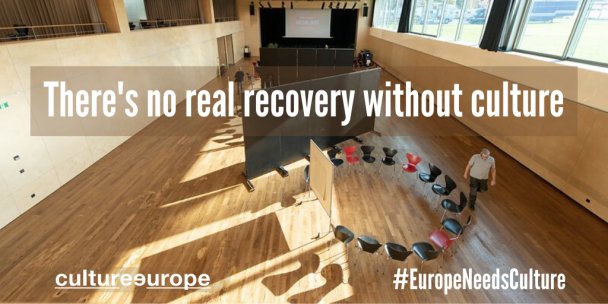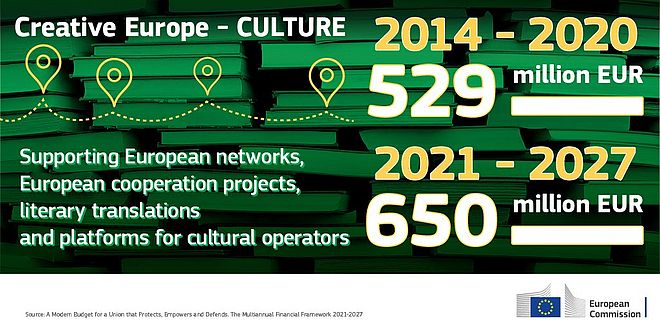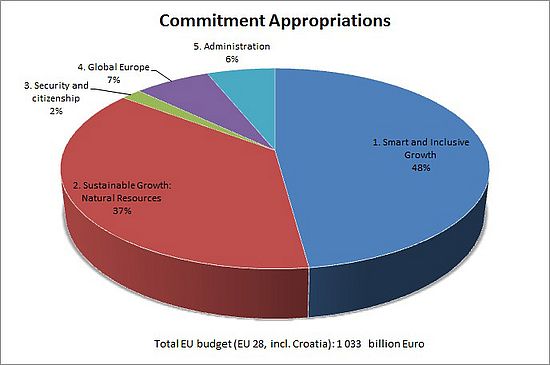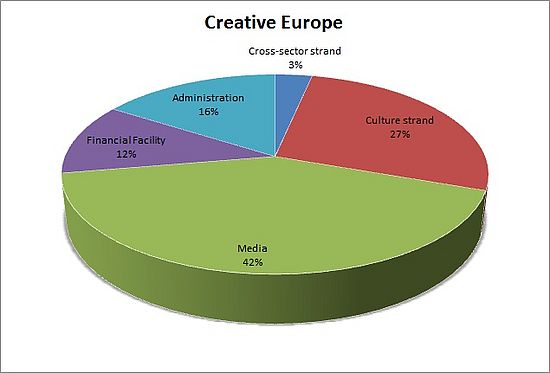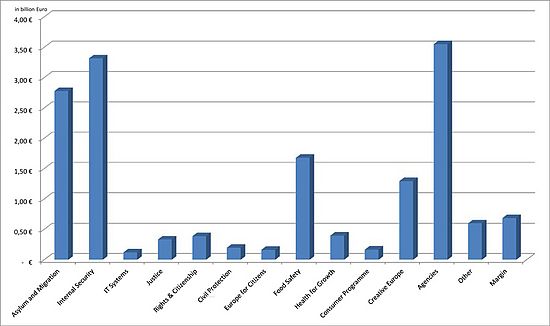Want to know more?
Check out our webinar to learn more about the MFF negotiations
Creative Europe in the new Multiannual Financial Framework 2021-2027

Picture by: European Union 2021
With a budget of 2.2 billion EUR, Creative Europe 2021 - 2027 it is the biggest ever funding programme for the cultural and creative sector at EU level.
This budget will allow the continuation of successful funding schemes like the cooperation projects, European networks and platforms but also include new funding strands. This includes in particular a dedicated funding scheme for music, with a focus on contemporary and live music.
The future programme will give priority to the promotion of female talent and support to women’s artistic and professional careers. The new programme will also introduce as a key objective the promotion of access for and the participation of people with disabilities and marginalised groups in the cultural and creative sector.
Creative Europe Calls
Below is an overview of the main funding strands in Creative Europe.
Creative Europe Cooperation Projects
Cooperation projects support a large diversity of players active in different cultural and creative sectors.
The focus is on European artistic cooperation and innovation on topics such as audience engagement, social cohesion, digitisation, contribution to the European Green Deal and sector-specific challenges in the book, music, architecture and culture heritage sectors.
Applicants can choose between small, medium or large scale projects depending on the size of their consortium.
Creative Europe Networks
The network funding scheme supports capacity-building projects implemented by representative, multi-country, membership-based networks of European cultural organisations.
European platforms for the promotion of emerging artists
This action supports projects that aim to increase the visibility and the circulation of European emerging artists and works outside their own borders, in Europe and beyond. It also seeks to increase access to and participation in cultural events and activities, as well as audience engagement and development. For the purpose of this action, projects shall establish Platforms that can be defined as showcase/springboard platforms composed of a coordinating entity and member organisations with a common artistic editorial and branding strategy.
European platforms
Pan-European cultural entities
This funding scheme supports cultural entities – in the case of the 2021 call, orchestras with artists from at least 20 countries – whose aim is to offer training, professionalisation and performance opportunities for young highly-talented artists.
Pan-European cultural entities
Culture Moves Europe
Culture moves Europe provides mobility grants for artists and cultural professionals in all 40 creative Europe countries. It covers the sectors of architecture, cultural heritage, design and fashion design, literary translation, music, performing arts and visual arts. The scheme consists of two action lines: individual mobility (for individuals and groups of up to five persons) and residencies.
MFF and Creative Europe negotiations
The EU leaders have agreed on a proposal for the next Multiannual Financial Framework (MFF) and the Recovery Package which they presented on 21 July. Overall, they suggest a 1074.3 billion Euro MFF and a Recovery Package of 750 billion Euro. For the purpose of further negotiations, these two proposals are now considered as one package since the Next Generation EU recovery plan is in effect embedded within the long-term budget. Compared to the Commission proposal from May 2018, the overall MFF is reduced (previously 1100 billion Euro) and the Recovery Package has a higher share of loans than grants.
However, the MFF and the Recovery Package are not a done deal, yet. The MFF and the Recovery Package will still have to be approved by the European Parliament.
→ Read here the conclusions of the European Council
→ Read more from Culture Action Europe about the results of the European Council meeting
Creative Europe
In the latest agreement in November 2020, the overall budget of Creative Europe for 2021 - 2027 is increased to 2.2 billion Euros. This is an increase of 600 million Euros compared to the previous agreeement of the European Council, which brought Creative Europe to 1.64 billion Euros which is the same level as in the Commission proposal from May 2018.
The last months had brought forward different budget proposals for Creative Europe. The latest figure of 2.2 billion Euros is the highest budget that decision makers have agreed upon during this negotiating period. Although the budget has not reached the doubling (to 2.8 billion Euros) that the sector and the European Parliament have continously advocated for, it is still a great success to have reached this significant increase for the cultural and creative sector.
EMC position
Uphold culture in the EU budget!
This statement by Culture Action Europe emphasizes that there is no real recovery without culture. It highlights the particular importance of Creative Europe at a time when the international dimension of culture is under particular threat, as most of the internationalisation budgets are cut or suspended, localisation tendencies are growing, and cross-border mobility is at risk. The statement calls on EU Member States to double the budget of Creative Europe and to make sure that additional funds from Next Generation EU reach cultural operators.
EMC Statements on Creative Europe
You can find a full list of our statements on the MFF and Creative Europe here
EMC in Stakeholder Consultation of the European Parliament
On 5 June 2020, the EMC was one of 16 cultural networks invited to a Stakeholder Consultation of the Culture and Education Committee in the European Parliament on Creative Europe. In the exchange with the Creative Europe rapporteur Massimiliano Smeriglio (S&D, IT) and the shadow rapporteurs, the EMC highlighted crucial aspects for the future Creative Europe programme. One of the main concerns of the EMC is the overall budget of the programme but also the access of small and micro organisations. The EMC therefore highlighted the need to raise the co-funding rate of the EU and to ease rules on the financial capacity.
What happened so far and next steps
- The European Parliament still needs to approve the proposal for the MFF and the Recovery Package. Although the European Parliament can only approve or not approve the proposal without making any changes, informal negotiations between the Council (represented by the current German Presidency), the European Commission and the European Parliament have started on 27 August.
- An agreement by the European Council was reached at an extraordinary meeting of the Heads of State and Government on 21 July.
- The Culture and Education Committee (CULT) of the European Parliament was quick in heavily criticising the updated proposal in a press release on 27 May calling it "deeply disappointing". The Committee discussed the proposal on 22 June and issued another press release voicing that they do not support the Commission proposal.
- The Coronavirus has also changed the negotiations on the MFF. An updated proposal in combination with a recovery package called Next Generation EU was presented by the European Commission on 27 May 2020. This included a budget proposal for Creative Europe at 1.52 billion Euros which is less than the 2018 proposal but a slight increase compared to the current programme.
- A negotiating box presented by the Finnish Presidency in November 2019 and a proposal by the President of the Council Charles Michel in February 2020 could not reach an agreement in the Council. Both proposals did include figures for the budget headings, not concrete budget was proposed for Creative Europe. However, calculations on the overall budget proposal indicated that Creative Europe would receive less than proposed by the Commission in 2018.
- On 28 March 2019 the Plenary of the European Parliament adopted their report on Creative Europe. Members of the European Parliament voted in favor of doubling the budget of the 2021-2027 Creative Europe programme and to enhance international circulation of works, supporting better mobility for artistsThe document will be published soon.
- On 20 February 2019, the Culture and Education Committee (CULT) of the European Parliament adopted the draft report from rapporteur Silvia Costa. The draft report includes a general objective promoting the intrinsic value of culture, a double budget increase, the re-introduction of European added value, as well as stronger synergies with other programmes and mobility of artists and circulation of works as well as more specifications of the sector specific funding for music.
- In December, the Council Council of the European Union, made up of the Ministers for Culture and Education from the Member States, agreed its position (partial general approach) on the Creative Europe proposal in December 2018. It is the mandate for the negotiation with the European Parliament which will begin this year. The agreement does not include the budget for the future Creative Europe programme, since the final amounts will depend on the agreement reached on the next Multiannual Financial Framework (MFF).
- On 14 November 2018, the European Parliament adopted the Interim Report on the Multiannual Financial Framework (MFF) 2021 - 2027. This proposal includes doubling the budget of Creative Europe compared to the current programme (2014 - 2020).
Future of EU funding for culture 2021 - 2027
On 2 May 2018, the European Commission presented their proposal for the Multiannual Financial Framework (MFF), the EU budget for 2021 - 2027. The Commission proposes to keep Creative Europe - the EU's funding programme for the cultural and creative sector - as a stand alone programme with an overall budget of 1.85 billion Euros (compared to 1.4 billion Euros from 2014 - 2020). These 1.85 billion Euros are allocated as follows:
- 1.2 billion Euro for MEDIA (audiovisual sector)
- 650 million Euro for Culture
Here you can find more information about the budget proposal.
The proposal for the new Creative Europe programme 2021-2027 was published on 30 May 2018. The Culture strand shall continue to include funding for cooperation projects, European networks and European platforms. New additions are the funding for mobility of artists and cultural and creative operators and a dedicated support for the music sector "promoting diversity, creativity and innovation in the field of music, in particular distribution of musical repertoire in Europea and beyond, training actions and audience development for European repertoire, as well as support for data gathering and analysis".
This first proposal by the European Commission will now be further negotiated by the European Parliament and the Council of the EU and is therefore still subject to change.
Culture Action Europe has published a statement on the new proposal welcoming increased opportunities for cross-border cooperation and cross-border projects and encouraging advocacy for a strong cultural programme on national level.
Creative Europe Programme 2014 - 2020
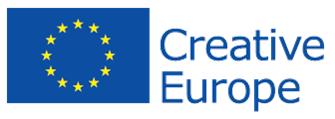
Creative Europe replaces the MEDIA, MEDIA Mundus and Culture programmes, and the special Culture sub-programme of Creative Europe will probably be of most interest to you, as it corresponds to the previous culture programme by supporting ‘cultural and creative organisations with a view to helping them operate transnationally and promoting cross-border circulation of works of culture and mobility of cultural players’.
In April 2017 the European Commission launched a consultation regarding the Creative Europe Programme. Please find our answers here.
History of Creative Europe Programme
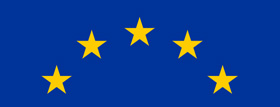
On 23rd November 2011, the European Commission published its proposal for Creative Europe.
According to Andoulla Vassilou, Commissioner for Education, Culture, Multilingualism and Youth, The cultural and creative sectors offer great potential to boost jobs and growth in Europe. EU funding also helps thousands of artists and cultural professionals to reach new audiences. Without this support, it would be difficult or impossible for them to break into new markets. Therefore, Creative Europe sets out to:
- help the cultural and creative sectors to seize the opportunities of the ‘digital age’ and globalisation
- enable the sectors to reach their potential so that they can contribute to the Europe 2020 goals for sustainable growth, jobs and social cohesion.
- open up new international opportunities, markets and audiences
- build on the success of the MEDIA and Culture programmes
The proposal forsees 3 Strands: Culture, Media, and a cross-sectoral strand consisting of a financial guarantee facility.
View the European Commission presentation on the Creative Europe programme here.
The EMC issued this statement on the EP's Creative Europe programme proposal already in May 2011.
At its meeting under the Danish Presidency in Brussels, the EU Council of Culture Ministers adopted its position on Creative Europe on 10-11th May 2012, which highlighted the need for an equal recognition of the intrinsic and economic value of culture. View the position paper here.

The EU held its extraordinary budget summit on 22 & 23 November 2012 at which the heads of state discussed the future budget of the EU for the years 2014-2020. Already in the forefront, it was discussed how and where to cut the proposed budget of the EU Commission. In its negotiation box the Cyprus Presidency suggested to cut all budgets horizontally.
In the frame of the we are more campaign, a letter was formulated that was mailed out to the heads of state before the upcoming EU summit. The we are more campaign is coordinated by Culture Action Europe (CAE), an advocacy and lobby organisation of which EMC Secretary General Simone Dudt ist the vice-chair.
Some facts and figures to support our argument:
The proposed EU budget for the seven year period is 1033 billion Euro. The proposed budget for Creative Europe is part of the heading 3 "citizenship, freedom, security and justice". As you can see Creative Europe is part of a heading that already is only 1,82% of the total proposed budget.
The total proposed budget for Creative Europe for the seven years from 2014-2020 is 1.8 billion Euro. According to the proposed spreading, the culture strand of the Creative Europe proposal would make up 0,05% of the total EU budget - this is too little to be cut!
In reaction to the budget cuts in the Eu's multiannual financial framework announced in early 2013, Culture Action Europe issued the following statement (PDF).
The European Music Council strongly supports this statement and encouraged its members to also spread it among their networks, and political contacts.
The European Commission's (EC) initial budget proposal had to be cut, and consequently the EC presented an adjusted budget version to the European Parliament and the Council (member states) http://www.consilium.europa.eu/special-reports/mff/documents#2. The discussions among the European Parliament, the Council and the Commission on the MFF are referred to as the Trilogue. The original budget for Creative Europe is now down to 1.29 billion Euro.
As you can see in the proposed adjustments, the costs for administration (such as agencies) are far less affected than the programmes. Therefore, the CAE statement called on the decision makers in the Trilogue to give priority to policy objectives, programmes and project investments.
This chart demonstrates the adjusted budget (and breakdown to headings and programmes) as proposed by the EC (click to enlarge).
On 19 November 2013, the European Parliament approved the new Creative Europe programme with a total budget of 1,46€ billion over the next seven years.







